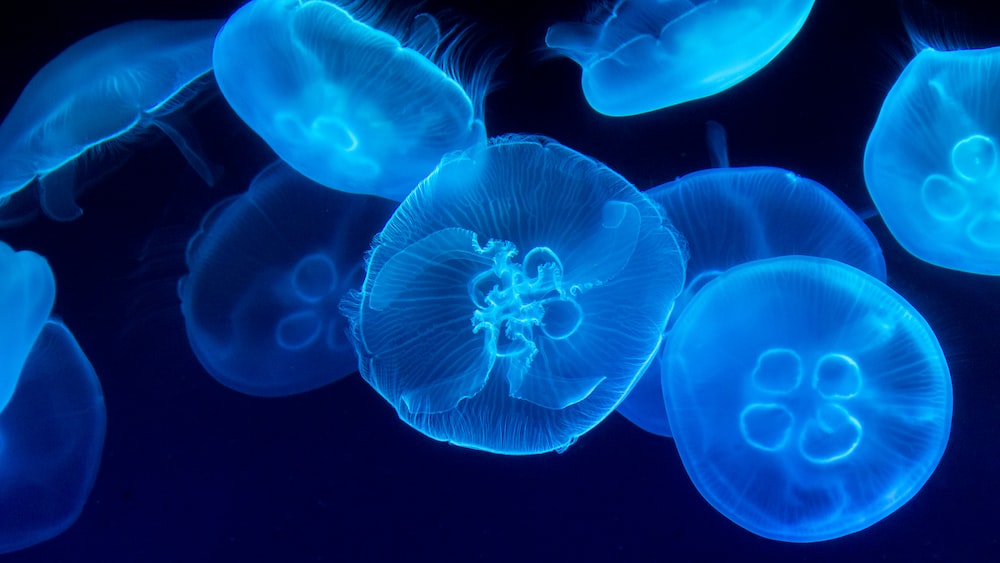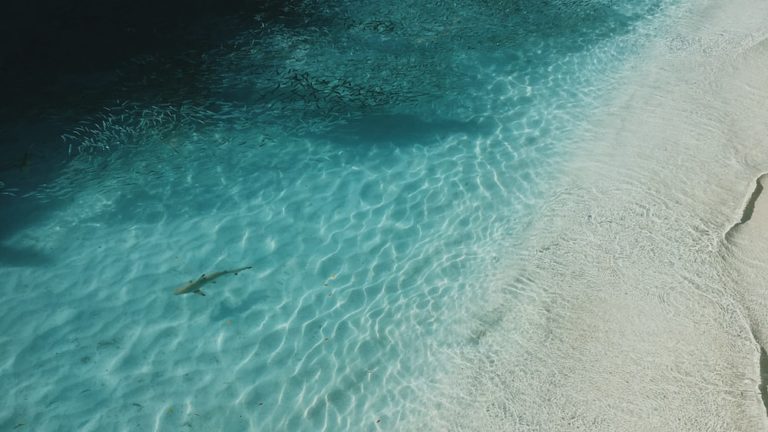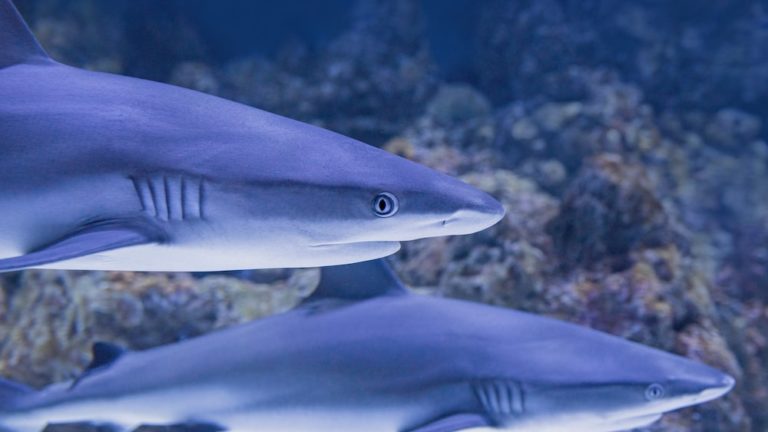Do Sharks Eat Jellyfish?
Do Sharks Eat Jellyfish?
Dive into the depths of the ocean, and you might witness the stunning ballet of marine life. Among the swirls of color and motion, two creatures that capture the imagination are sharks and jellyfish. But do sharks eat jellyfish? This is not just a curiosity for marine life enthusiasts but a question that sheds light on the complexities of the ocean’s food web.
Key Points:
- Sharks have varied diets, with some species including jellyfish in their meals.
- Jellyfish are an integral part of marine food webs, serving as both prey and predator.
- Sharks have evolved strategies to consume jellyfish, including avoiding their stinging cells.
- Not all shark species eat jellyfish, and those that do may not rely on them as a primary food source.
- Jellyfish blooms can influence shark behavior and movement in the ocean.
- Sharks play a crucial role in controlling jellyfish populations to maintain the balance of marine ecosystems.
For eco-adventurers and conservationists, understanding the relationship between these creatures offers a glimpse into the delicate balance that governs underwater ecosystems. As we embark on this exploratory journey, we aim to unravel the mysteries of shark diets and how jellyfish fit into the salty tapestry of their culinary choices.
Join me, Jasper, a seasoned marine biologist, as I lead you through tales of my encounters beneath the waves, backed by scientific insights and a splash of wit. We’ll navigate the seas of knowledge together, delving into the ocean’s depths to distinguish myth from reality in the diet of these majestic marine predators.
The Diet of Sharks and Jellyfish Consumption
As we submerge into the topic, let’s first acknowledge that the diet of sharks is as varied as the species themselves. From the mammoth whale sharks to the nimble reef predators, each species has evolved its own unique palate preferences. Jellyfish, with their gelatinous bodies and often sophisticated defense mechanisms, may not be the first menu choice for most sharks – yet, they are not exempt from this underwater feast.
Examining Shark Dietary Habits
Sharks range from the opportunistic scavengers to the meticulous hunters of the sea. Most sharks are carnivorous, preying on fish, cephalopods, and sometimes even other sharks. However, some species are more like oceanic omnivores and will not shy away from consuming a variety of organisms, including jellyfish.
As apex predators, sharks play a pivotal role in maintaining the health of marine ecosystems. Their dietary habits are influenced by availability, competition, and the energetic value of their prey, painting a mosaic of feeding behavior throughout the ocean. We must also consider the role of more specialized feeders, filter feeders like the whale shark, whose diet contrasts sharply with that of their sharp-toothed relatives.
Sharks have diverse feeding behaviors influenced by availability, competition, and prey energy value, which are crucial for maintaining the health of marine ecosystems.
The Role of Jellyfish in Marine Food Webs
Jellyfish are often described as drifters of the ocean, moving with the currents, and form an integral part of marine food webs. As prey, they provide sustenance for a variety of marine animals, including some species of sharks. The jellyfish’s place in the food web is significant, acting as both predator and prey.
Despite their simple structure, jellyfish are far from defenseless, equipped with stinging cells that deter many potential predators. Yet, they are consumed not only by sharks but also by other reef animals, turtles, and even other jellyfish, slotting them into various trophic levels and showcasing the fluidity of marine dietary dynamics.
Interactions Between Sharks and Jellyfish
When pondering the query ‘do sharks eat jellyfish?’, it’s vital to consider the nature of their underwater interactions. These encounters are governed by instinct, survival, and the perpetual search for sustenance that plays out beneath the waves. Predation is a complex dance, and in the sea, sharks and jellyfish engage in a choreography that is both ancient and continuously evolving.
The Predatory Behavior of Sharks Towards Jellyfish
Sharks, as top predators, exhibit various strategies when hunting their prey. In the case of jellyfish, the approach can be surprisingly nuanced. Some sharks may opportunistically feed on jellyfish when other prey is scarce, while others may target them due to the ease of capture.
A shark’s decision to dine on a jellyfish likely involves a cost-benefit analysis – weighing the nutritional value against the potential risk of stings. Observations have shown that sharks are capable of manipulating their prey, sometimes even consuming jellyfish in a way that avoids contact with the stinging tentacles.
Defense Mechanisms of Jellyfish Against Sharks
Jellyfish may seem ephemeral and passive, floating in the ocean like delicate specters, but their defenses are anything but ghostly. Their primary mode of defense, nematocysts (stinging cells), can be quite effective against smaller predators or those unprepared for the unexpected zing of their touch.
However, against sharks, their line of defense is not ironclad. Some sharks have been known to brave the sting, undeterred by the potential discomfort, suggesting either a tolerance to the venom or a method of avoiding it altogether. Additionally, the jellyfish’s translucent camouflage may not always prove effective against the keen-eyed hunters of the deep.
Jellyfish have adapted over millennia, but so have sharks, leading to an evolutionary arms race that plays out in the open ocean. It’s a testament to nature’s complexity that despite their arsenal of stingers, jellyfish have remained on the menu for some of these tenacious cartilaginous fish.
Jellyfish defenses, including stinging cells and translucent camouflage, are not always effective against sharks, leading to an evolutionary arms race between the two species.
Species-Specific Feeding Patterns
Exploring the gastronomic proclivities of sharks begins with acknowledging the diversity within the order. Not all shark species are inclined to snack on jellyfish, and those that do have developed unique adaptations that facilitate this unusual dietary choice.
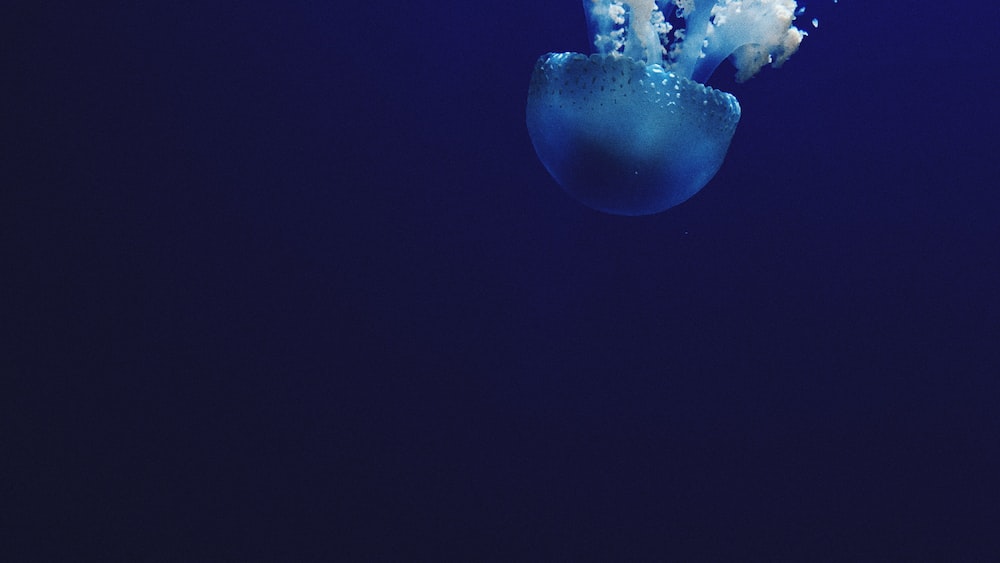
Which Shark Species Are Known to Eat Jellyfish?
In the vast oceanic banquet, only certain sharks have a palate for jellyfish. Filter feeders like the gargantuan whale sharks and basking sharks glide through the water, scooping up plankton and small fish, and in doing so, they may also inadvertently ingest jellyfish. Their enormous mouths and specialized gill rakers allow them to sieve the bounty of the ocean, including the gelatinous drifters.
On the other end of the spectrum, smaller sharks, such as smoothhound sharks, are also known to include jellyfish in their diets. These bottom-dwelling sharks, with their less selective dining habits, demonstrate the adaptability of their species. Understanding these variations in dietary preferences highlights the flexibility and survival strategies of sharks within different habitats.
Case Studies: Observations of Sharks Consuming Jellyfish
Anecdotal and scientific observations alike offer insight into the instances where sharks consume jellyfish. Take the scalloped hammerhead, for example, which has been seen plucking jellyfish from the water column with precise, measured movements that suggest a familiarity with this prey.
In one observed encounter, a group of juvenile hammerheads took turns nibbling on a moon jellyfish, seemingly unfazed by any stings. This scene delineated more than just a feeding event; it depicted a learning environment where these young sharks were discovering techniques to tackle gelatinous prey.
Equally fascinating are reports from divers who’ve witnessed large pelagic sharks, such as the tiger shark, consume jellyfish. While such events are rare, they hint at the opportunistic nature of sharks, willing to exploit numerous food sources to sustain their nomadic lifestyles.
Nutritional Value of Jellyfish for Sharks
Contemplating whether jellyfish serve as a substantial food source for sharks leads us into the realm of nutritional ecology. Jellyfish are composed mostly of water, which implies that their caloric offering may be low compared to other marine animals. Yet, the fact remains that some sharks include them in their diet, possibly capitalizing on their abundance during blooms.
Are Jellyfish a Sufficient Food Source for Sharks?
While pondering whether do sharks eat jellyfish, one must consider the nutritional value jellyfish provide as prey. Jellyfish, those drifting cnidarians of the sea, are more water than substance, often making them less calorie-dense than other marine animals. For many sharks, jellyfish are not the prime rib of the sea but rather the celery; it’s a snack that requires much munching for little energetic return.
However, not all sharks turn their noses up at this gelatinous hors d’oeuvre. For species like the gray triggerfish which also eat jellyfish, these creatures can serve as an opportunistic food source, especially in times when their preferred menu items are scarce. The crucial point remains that while sharks can eat jellyfish, they are unlikely to rely on them as a staple food source.
The Risks and Benefits of Sharks Eating Jellyfish
When sharks do indulge in a jellyfish feast, they’re playing a bit of a nutritional lottery. On the flip side, jellyfish can be rich in protein, which is a boon for the sharks’ muscle maintenance. Moreover, in an ocean where the buffet is sometimes limited, jellyfish can act as a readily available albeit less energy-packed meal.
Yet, there are risks involved. The predators of the sea have to navigate through the stinging tentacles of these cnidarians – a bite that can sometimes bite back. The venom of jellyfish can be deterrent and harmful to other sea creatures, although many sharks are adapted to handle their sting, a testament to their place atop the food chain. Balancing act indeed, their dietary choices reflect the dynamic and sometimes harsh realities of ocean life.
Sharks face a nutritional gamble when they feast on jellyfish, which can provide protein for muscle maintenance but also pose risks due to their venomous sting.
The Impact of Jellyfish on Shark Behavior
Jellyfish swarms, known as blooms, can be both a boon and a bane in the watery world they share with sharks. These unpredictable gatherings are like underwater festivals that can shift the ambiance, influencing shark behavior as they navigate the crowd. The presence of jellyfish often signifies changes in the ocean’s health and can, in turn, dictate the movement and feeding patterns of these apex predators.
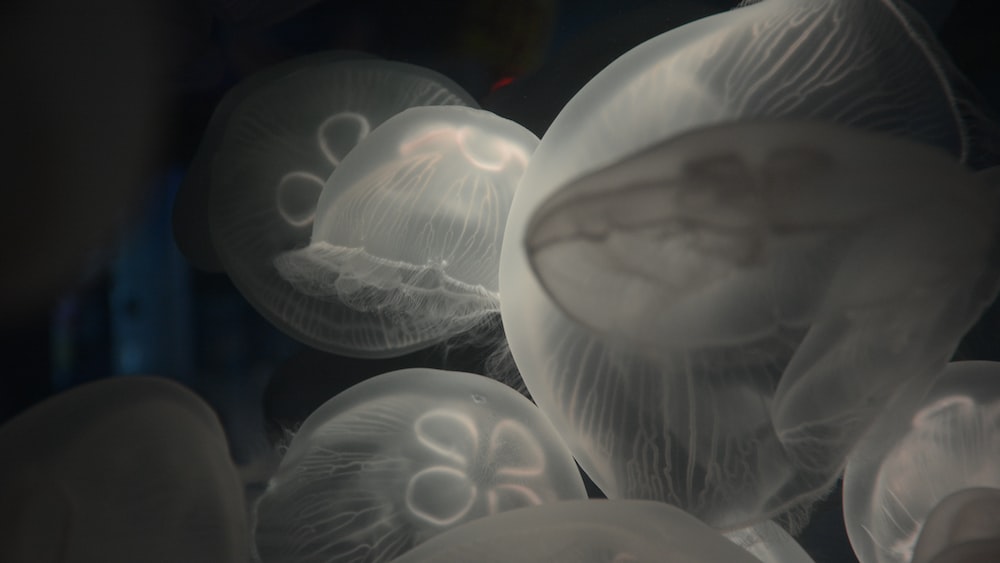
How Jellyfish Blooms Can Affect Shark Movement and Feeding
Jellyfish blooms, those spectacular marine spectacles, act almost like traffic signals in the underwater highways, directing where sharks roam. Sharks are known to be astute feeders, often seeking out areas where prey is abundant; a bloom can be a neon sign flashing “dinner is served”.
Additionally, these blooms can alter local ecosystems, affecting the availability of other prey species and thus impacting sharks’ hunting strategies. In some cases, a large concentration of jellyfish can deter sharks from an area, due to the effort required to navigate through them versus the energy yield of the jellyfish themselves.
It is not all about avoiding inconvenience; jellyfish blooms are part of the natural order, offering a buffet that, while not the heartiest, provides sustenance in lean times. They can encourage sharks to explore new territories or adjust their hunting techniques, revealing the plasticity and adaptability of these oceanic voyagers.
Sharks’ Role in Controlling Jellyfish Populations
Sharks, as top predators, play a crucial role in maintaining the balance of marine ecosystems. Their dining habits can directly influence jellyfish populations, keeping these animals in check. Without the predation pressure sharks provide, jellyfish numbers could skyrocket, leading to imbalances that ripple through the food web.
It’s an ecological dance where each participant has a part to play. The sharks help manage jellyfish numbers, preventing the cnidarians from becoming too dominant and disrupting the marine hierarchy. This control is vital for the health of the ocean as jellyfish do have the potential to outcompete other species, monopolizing resources if left unchecked.
FAQs
1. Do all species of sharks eat jellyfish?
Not all species of sharks eat jellyfish; feeding habits vary widely across different shark species. Some sharks may include jellyfish in their diet but rarely rely on them as a primary food source due to their low nutritional value.
2. Can jellyfish venom harm sharks?
Jellyfish venom can harm sharks, though many shark species have evolved with defenses against the stings. The level of harm often depends on the shark species and the type of jellyfish.
3. How do sharks eat jellyfish without getting stung?
Sharks eat jellyfish using specialized feeding behaviors and physical adaptations that allow them to avoid or mitigate the effects of jellyfish stings. Their tough skin and strategic biting techniques are key defenses.
4. Are there any recorded instances of sharks avoiding jellyfish?
There are recorded instances of sharks avoiding jellyfish during feeding. This avoidance is often due to the relatively low nutritional value of jellyfish and the potential risk of stings.
Conclusion
As we dive into the depths of our understanding, it’s clear that the ocean’s web of life is intricate, with each creature playing its part. Do sharks eat jellyfish? Yes, they do, albeit not as a primary food source, but as an occasional snack that offers its own set of risks and rewards. The dynamic relationship between these two sea inhabitants shapes their behaviors and, in turn, impacts the broader marine ecosystem.
While the answer isn’t as straightforward as one might think, the underwater interactions between sharks and jellyfish reflect a dynamic dance of survival and symbiosis – one where the predator and the cnidarian coexist in a balance as fluid as the sea itself. May we, as ocean advocates and enthusiasts, continue to marvel at these wonders while contributing to the health of our planet’s blue heart.
Until next time, may your love for the sea grow as deep as the ocean’s own mysteries. With waves of gratitude, Jasper Flynn.

